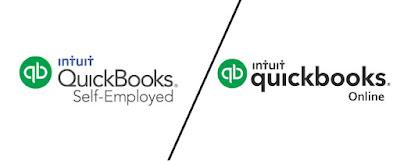Are you a self-employed individual looking for the perfect accounting solution? Look no further, as we compare two popular options in this blog post: QuickBooks Self Employed Vs Online. Both of these platforms offer powerful features that can streamline your financial management processes and save you valuable time. But when it comes to security, which one offers better protection for your sensitive data? Join us as we delve into the world of QuickBooks Self Employed and QuickBooks Online to find out!

QuickBooks Self Employed Vs Online Comparison
When it comes to choosing between QuickBooks Self Employed vs QuickBooks Online, there are a few key factors to consider.
Let's talk about pricing. QuickBooks Self Employed offers a more affordable option for freelancers and self-employed individuals who have basic accounting needs. On the other hand, QuickBooks Online provides more advanced features at a higher price point, making it suitable for small businesses with more complex financial requirements.
In terms of functionality, both platforms offer similar core features such as expense tracking, invoicing, and tax calculations. However, QuickBooks Online goes a step further by providing additional tools like inventory management and project tracking capabilities.
Another important aspect to consider is accessibility. With QuickBooks Self Employed being primarily designed for mobile use, you can easily manage your finances on-the-go through the mobile app. Meanwhile, QuickBooks Online offers the flexibility of accessing your accounts from any device with an internet connection.
When it comes to security measures in place to protect your sensitive data, both options prioritize safeguarding your information through encryption and secure servers. However, some users may feel more comfortable knowing that their data is stored locally on their own devices with QuickBooks Self Employed.
The choice between these two platforms boils down to your specific needs as a self-employed individual or small business owner. Take into account factors such as pricing structure, required functionality, and preferred level of data storage security before making your decision.
QuickBooks Self Employed Vs Online Overview
When it comes to managing your finances as a self-employed individual, having the right accounting software can make all the difference. Two popular options in this space are QuickBooks Self Employed and QuickBooks Online. Let's take an overview of these two platforms and see what they have to offer.
QuickBooks Self Employed is specifically designed for freelancers, independent contractors, and small business owners who need a simplified solution for tracking their income and expenses. It allows you to easily separate personal and business expenses, track your mileage, generate invoices, and even estimate quarterly taxes.
On the other hand, QuickBooks Online is a more robust accounting software geared towards small businesses with multiple employees or complex financial needs. It offers features such as inventory management, budgeting tools, payroll processing capabilities, and integration with third-party apps.
Both platforms offer mobile apps that allow you to manage your finances on-the-go. They also provide bank-level security measures to protect your sensitive financial data.
In terms of pricing, QuickBooks Self Employed has a lower monthly cost compared to QuickBooks Online. However, it lacks some of the advanced features that may be essential for larger businesses.
The choice between QuickBooks Self Employed vs Online depends on the specific needs of your business. If you are a freelancer or sole proprietor looking for basic bookkeeping features at an affordable price point - then QuickBooks Self Employed may be sufficient for you. On the other hand if you have multiple employees or require more advanced functionality like inventory management or payroll processing - then investing in QuickBooks Online would be worth considering.
It's important to carefully evaluate both platforms based on their respective feature sets before making a decision that best aligns with your unique business requirements.
QuickBooks Self Employed Vs Online Features
QuickBooks Self Employed and QuickBooks Online are both popular accounting software options offered by Intuit. While they share the same parent company, there are some key differences in terms of features that differentiate them from each other.
QuickBooks Self Employed is specifically designed for self-employed individuals who need a simple solution to track their business income and expenses. It offers features such as automatic mileage tracking, receipt capture, and quarterly tax estimation. This version is ideal for freelancers or independent contractors who have basic accounting needs.
On the other hand, QuickBooks Online caters to small businesses with more complex financial requirements. It provides a wide range of features including invoicing, bill payment, inventory tracking, and multi-user access. With QuickBooks Online, you can also integrate with third-party applications such as CRM systems or payroll services to streamline your business operations.
In terms of security features, both versions offer various measures to protect your financial data. They use industry-standard encryption technology to secure your information during transmission and storage. Additionally, they provide regular data backups so that you don't lose any important records.
The choice between QuickBooks Self Employed vs QuickBooks Online depends on the size and complexity of your business needs.
If you're a self-employed individual with basic accounting requirements , then QuickBooks Self employed might be sufficient . However if you run a small business with multiple employees or require advanced features like inventory management , billing etc., then it's worth considering QuickBooks online which offers more comprehensive functionality.
QuickBooks Self Employed Vs Online Which Is Best For Accounting
When it comes to accounting software, QuickBooks is a name that often comes up in the conversation. However, choosing between QuickBooks Self Employed and QuickBooks Online can be a tough decision for many self-employed individuals. Both options have their own unique features and benefits that cater to different business needs.
QuickBooks Self Employed is designed specifically for freelancers, independent contractors, and sole proprietors who need basic bookkeeping functionalities. It allows users to track income and expenses, separate personal and business finances, generate invoices, estimate taxes owed, and even capture receipts using the mobile app.
On the other hand, QuickBooks Online offers more comprehensive accounting features suitable for small businesses with multiple employees or complex financial operations. In addition to all the features available in QuickBooks Self Employed, it includes advanced capabilities like inventory tracking, time tracking for employees or contractors working on projects billed by time spent.
The choice between these two versions ultimately depends on your specific needs as a self-employed individual or small business owner. If you are just starting out or have simple accounting requirements without any payroll needs or inventory management complexities then QuickBooks Self Employed might be sufficient for you.
However if you foresee growth potential in your business where you may eventually require additional features such as managing employee payroll or handling inventory then opting for QuickBooks Online would provide better scalability options.
In conclusion both versions of QuickBooks offer robust security measures ensuring protection of sensitive financial data but differ in terms of offered functionality catering distinct market segments within self employed individuals . Before making a decision consider evaluating your current needs along with future growth potentials so that you can choose an option that best aligns with your long-term goals.
Conclusion
After comparing QuickBooks Self Employed vs QuickBooks Online, it's clear that both options offer strong security features to protect your financial data. However, the best choice for you will depend on your specific needs as a self-employed individual or small business owner.
If you're a freelancer or independent contractor with simple accounting needs, QuickBooks Self Employed may be the ideal solution for you. It offers essential features like invoicing, expense tracking, and basic tax support while keeping things streamlined and user-friendly.
On the other hand, if you have more complex accounting requirements or need multiple users to access your financial information, QuickBooks Online would be worth considering. With its robust set of features including advanced reporting capabilities and customizable invoice templates, it provides greater flexibility and scalability for growing businesses.
In terms of security measures, both platforms utilize encryption technology to safeguard your data during transmission and storage. They also have stringent authentication protocols in place to ensure only authorized individuals can access sensitive information.
When choosing between QuickBooks Self Employed and QuickBooks Online, it's important to evaluate your unique business needs along with factors such as budget constraints and desired functionality. Take advantage of free trials offered by Intuit to test out each platform before making a decision.
Remember that regardless of which option you choose – whether it's QuickBooks Self Employed or QuickBooks Online – maintaining good cyber security practices is crucial in protecting your financial data. This includes regularly updating software versions, using strong passwords, enabling two-factor authentication whenever possible, and being cautious about sharing login credentials.
By prioritizing security alongside functionality in your accounting software selection process ,you can confidently manage your finances while minimizing the risk of unauthorized access or data breaches.

